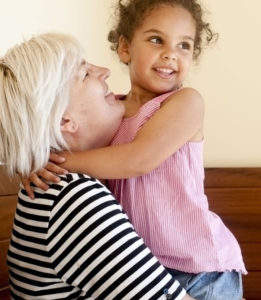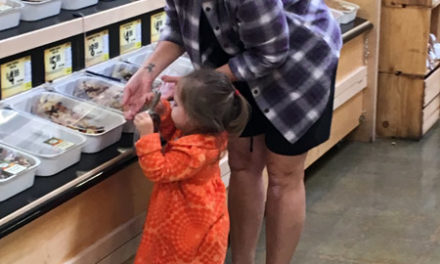by Ken Canfield, Ph.D.
Don’t all grandchildren love playdough? Mine sure do. They love to roll it, shape it and mold it. They love the colors, the pliability and the texture of this clay-like substance. With a few lumps of playdough, you and your grandchild can create something of beauty which adds a spark to their imaginary world. It’s an inexpensive way to spend time with your grandchild, getting in tune with his world and producing a piece of art he can be proud of.
There are ways in which your grandchild’s emotional development can be shaped like playdough. Taking time to notice, celebrate and build on their achievements can make a huge difference in their growth. And even when grandchildren grow up beyond thinking playdough is fun, your proactive investments in building them up can help them develop an emotional endowment that keeps on giving when you’re not around.
In some sense, your attempts to strengthen your grandchildren are all about meeting their emotional needs. And I believe grandparents are in a unique and strategic situation compared to a child’s parents. We are in a life stage with much more experience and probably fewer responsibilities, and we can make significant contributions to a child’s life. In many instances, our forthright commitment to be engaged with our grandchildren can also bring healing and refreshment to our relationship with our adult children.
To better grasp the essence of emotional strengthening, think in terms of positive past experiences you have had with your grandchild, add in what their present needs require, and top it off with what you believe is important to their future.
Corresponding to the past, present and future elements of their emotional development are three keys: appreciation, encouragement and blessing. When these elements are applied regularly to your grandchildren’s lives, they will prosper and you will experience a surge of joy in the process.
Appreciation and Gratitude
Expressing appreciation involves wisely utilizing specific stories, observations and family history to build a strong emotional foundation.
First, think of showing appreciation to your grandchild as a planned event. In other words, make a list of positive actions and experiences you have observed in your grandchild and draw from that list when you have an opportunity to be with them. After all, don’t we plan and prepare what we are going to wear or eat during each day? Why wouldn’t we plan to have our appreciation and gratitude list handy and ready for review when “God’s little people” come for a visit? Seriously, our memory is fading—both short and long term—so writing those appreciative elements down is a way to make sure they are recorded in the annals of a grandchild’s history.
In addition, when you express appreciation, be specific. You might say to your granddaughter, “I appreciate the way you care for your sister,” “I appreciate your smile,” or, “I admire your decisive thinking.” Your granddaughter will beam with joy when she knows that you are watching and that you really care.
Also, use the power of story. Since grandparents embody family history, that gives us a unique role compared to other family members. For example, we can tell about how a grandchild’s entrance into the family was a sacred event, and in that context express a deep appreciation and gratitude for their personality, achievements and virtues.
Of course there are spontaneous ways to show appreciation, but when you add history and depth to the spontaneous, it becomes more powerful. For example:
“When I was a child I didn’t get along with my sister, and it moves my heart to see you care for your sister the way you do.”
“Growing up, my dad was always smiling, and when I saw him it made me smile too. When I see you smile, it reminds me of my dad.”
“I can see in your eyes you are always thinking. You are so tuned in to what’s going on. I wish I was as in tune as you are. When I was growing up, I was kind of spacey.”
When a grandparent shares a story, action or characteristic which demonstrates they know something important, and when a grandchild hears they are part of the narrative, it lights up a portion of their brain and creates a benchmark for future reference. Neurologists and the new field of neuropsychology confirm this. Moreover, appreciation has been known for decades to be a characteristic of a healthy household. Social scientists and scholars note that the regular practice of expressing appreciation in a family distinguishes them as a “strong family.”
Research has also found that being appreciated carries with it strong markers of physical and psychological health. Grandchildren who have a deep sense of gratitude and appreciation are more tuned into their own physical well-being, meaning they take better care of themselves, and they have a better grasp of how to handle negative emotions like anger, jealousy, frustration and regret. And mature adults who understand the value of appreciation have increased empathy, are less aggressive, sleep better and demonstrate increased mental strength.
Showing appreciation and telling stories that link your grandchildren to the experience helps them develop a sense of gratitude. And in the long term, both gratitude and appreciation open the door to trust and transparency, which are key facets of an emotionally connected life.
Encouragement
Encouraging words, thoughts and actions are important elements for building emotional capacity. In contrast to appreciation, which often has a basis in history, encouragement is focused on the present. When you are a consistent presence in your grandchildren’s lives, you have access to their most recent raw life experiences, which expose their strengths and weaknesses. In those situations, you can be a difference maker through words of encouragement.
Expressing encouragement shows that you know your grandchild, like everyone else, is facing challenges—regardless of how well she may appear to be doing. A grandfather or grandmother can add an extra set of eyes and ears focused on the best outcome and give a positive word, which will help to build up the grandchild’s confidence. What do you see in your grandchild’s life that needs an “Atta boy,” “You can do it,” “Hang in there,” or “I’m with you”? Certainly if all is going well, you can always voice a prayer of thanks with your grandchild to encourage her in a huge way.
Some recent research suggests that encouragement can be best understood by examining its focus, features and facets.
When the focus of encouragement is uplifting, it is most valuable. For example, “Have you ever considered a career in ______, because you are really good at ________.” Or, “Don’t worry, it really isn’t as bad as it seems. Hang in there. I know things will get better.”
The features of encouragement are the positive messages. We look for details that reveal areas where they may be vulnerable or struggling, or the ways we see progress, a good attitude, and best efforts. As encouragers, we become trustworthy experts who really know them well.
The perceived credibility of a grandparent is significant, and when coupled with the facet of ongoing communication, our encouraging words, thoughts and actions are life-giving and create those priceless generational connections.
As you probably know, being positive does not mean giving fluffy, sugar-coated praise or advice. Often, encouragement will have an exhortative aspect, where you might affirm your grandchild using phrases like: “I know you’ll do the right thing,” or, “I believe you’ll do what’s best. Let me know how I can help.” This type of encouragement is magnetic and can often be a prelude for your grandchild to disclose challenges that are threatening and deeply held in her heart.
When a grandchild is infused with emotionally attuned encouragement from a grandparent, she often begins to reciprocate. Suppose you and your grandchild are putting together a jigsaw puzzle and your grandchild finds an important piece. You might say, “Good job,” and she smiles. You’ve encouraged her. After this happens several times, she will start to notice when you find an important piece of the puzzle, and she’ll likely say, “Great job, Granddad,” or, “You did it, Nana!”
Grandchildren will want to spend time with people who encourage them in positive ways. Part of a parent’s role is to shape their children’s behavior, so a child may feel that she is constantly being told to improve, being corrected, or being evaluated—even if she really isn’t. That’s the “heavy lifting” of her parents’ role, and we can leave that to them. Our grandparenting time needs to be filled with laser-like encouragement.
This form of emotional investment in our grandchildren has a definite eye to the future. Blessing has roots in the notion that our grandchildren serve as messengers to a world we may never see, which makes it vitally important that we help to prepare them for the journey. Whether formal or informal, blessing can have a prophetic power that extends beyond our lives.
I appreciate the example I recently discovered in the life of actor Michael J. Fox. In his book, Lucky Man, he recalls the time of life when he was establishing himself as an actor in the challenging and confusing world of Hollywood. Even today, he has vivid memories of hearing positive words from his grandmother regarding his future—from his beginnings and onward. He writes, “I felt a very special bond with my grandmother. I’m sure my brother and sisters and cousins would share this sentiment, but mine goes back literally to the day of my birth.”
He then chronicles how his diagnosis with Parkinson’s disease at an early age was a blessing in disguise; he now views that challenge as a “gift” which has kept him focused on the most important things in life. Fox dedicated his book to the memory of “Nana” and he writes: “Every family has its stories, its formative legends. In mine, they tend to revolve around the figure of Nana, my grandmother. It was accepted as fact in our family that Nana had a gift of prophecy: whether literally true or not, what matters most here is that those who believed, especially my mother, ordered their lives—and mine—accordingly.”
A big part of blessing your grandchild is about seeing into his future, believing the very best, and conveying that to him in memorable ways. Although the specific emotional contribution of “blessing” has not been fully documented, this we do know: when grandchildren are surrounded by an abundance of blessings, their emotional reservoirs overflow. And during the dry and difficult times in life, their reservoirs will be full and they won’t suffer from thirst, emotionally speaking. In fact, they will be so abundantly full that they’ll be able to help fill up other thirsty souls they come across in life.
Even though we may conceive of a blessing as a more formal act, like giving approval to a child’s engagement or a toast at his wedding, there is also a less formal practical aspect in blessing, such as what John Trent described in his book, The Blessing.
For a grandparent, a blessing can take place through closeness and shared meaningful touches—like a hug, holding hands, putting your arm around his shoulder or touching his head. You can speak or write a message attaching high value to your grandchild’s place in your life. In contrast to appreciation and encouragement, blessings look forward to a special future. As a grandparent, you have a unique opportunity to cast vision into your grandchild’s future, and this should not be taken lightly. Your prophetic role in the family is a sacred one. Also, keep in mind that you bless your grandchild simply through your long-term commitment to his well-being. You’re there for him whenever you’re needed; you’re ready and willing to take action for his benefit and his future.
A Grand Opportunity…
Grandparents, you have a unique role to fulfill in your grandchildren’s world, and attending to their emotional development will have a huge impact. Don’t be naïve or complacent when it comes to your role. Don’t leave your grandchildren wandering or looking for the emotional fulfillment that they need and deserve. Steady streams of appreciation, encouragement and blessing are gifts that distinguish you as a grandparent. Empower and endow your grandchild. In any and every way possible, bring your best to your grandchild’s life.
Considering the reciprocal benefits that come back to us as a result of our active emotional engagement in our grandchildren’s lives, how can we resist? It’s our time to be the bold supporters we are destined to be, because grandkids matter!
A big part of blessing your grandchild is about seeing into his future, believing the very best, and conveying that to him in memorable ways.





